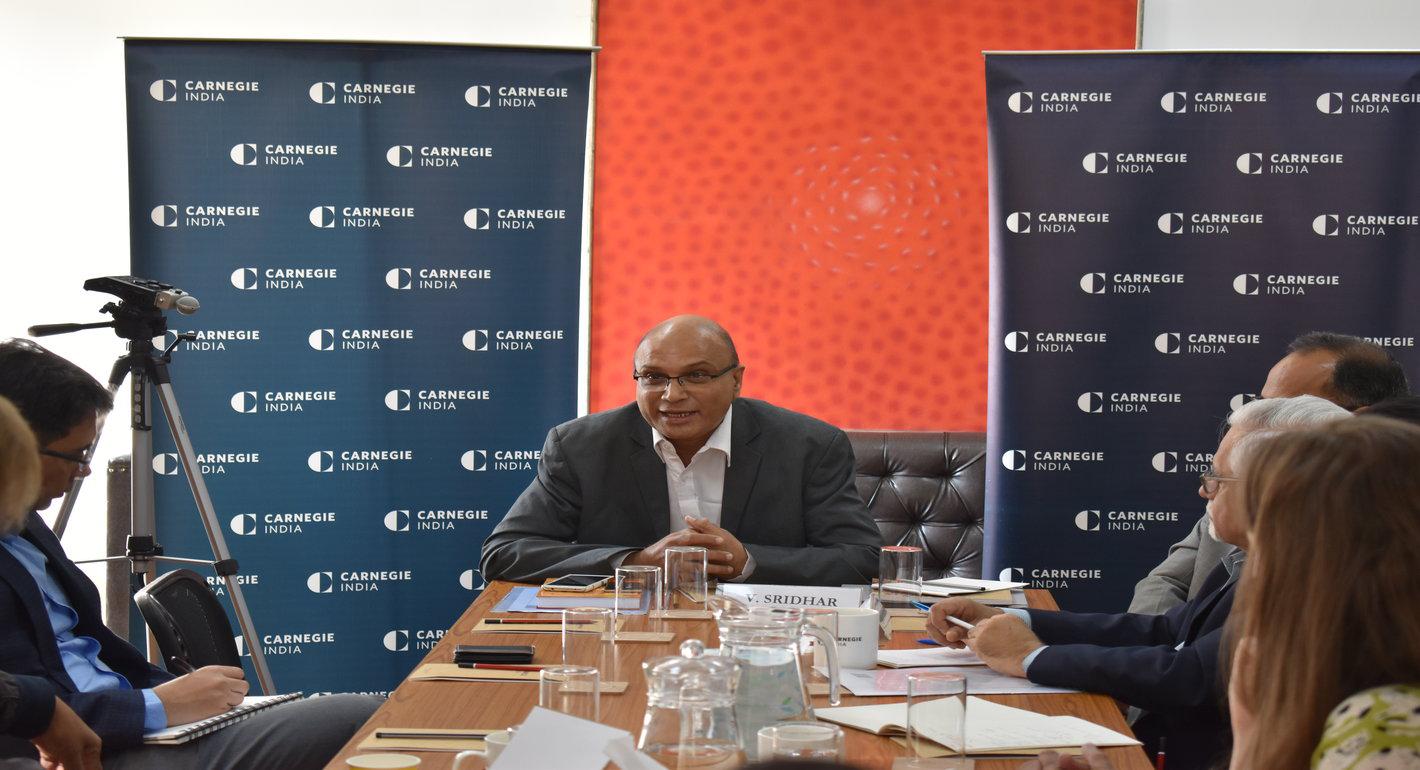Registration
You will receive an email confirming your registration.
The convergence of various technologies, ubiquity of the Internet, emergence of app economy, and pervasiveness of social media have caused a paradigm shift in the information and communication technology (ICT) industry. This poses several policy and regulatory challenges in the areas of industry structure, market power of firms, pricing of products and services, interconnection of networks, radio spectrum management, intellectual property rights, data privacy and security. In his recent book, Emerging ICT Policies and Regulations: Roadmap to Digital Economies, V. Sridhar provides a comprehensive overview of ICT regulation that integrates its complex technology, economics, and policy dimensions.
V. Sridhar discussed the policy and regulatory challenges posed by the expanding digital economy, based on the book. The discussion was moderated by Rajesh Bansal.
Discussion Highlights
- Regulation and Innovation: Participants began by discussing the effects of regulation on innovation in the information and communication technology (ICT) sector. They noted that regulators are entrusted with the task of protecting consumers and they must do so without stifling innovation. Participants agreed that in the initial stages of development, regulators must take a back seat and intervention is only required if and when a monopoly is formed. They believed that market share is an important indicator of a monopoly, noting that companies in the telecom industry are deemed to have a monopoly when they have spectrum holdings above 35 percent. Having low and unfair pricing can be seen as a step towards creating a monopoly but regulators must not intervene until the critical value is reached, they claimed. Participants also discussed the falling revenues and increasing debt of the major telecom service providers in India due to over regulation. They noted that there is a need for singular representation of the telecom service providers to prevent the government from micro managing the sector.
- Consumer Welfare and Producer Welfare: Participants stated that India’s adoption of consumer welfare standards is not very dynamic and therefore a heavy focus is given to consumer welfare, which affects competition and innovation in the long run. Small startups are unable to compete with large multinationals due to their high market share and require consumer welfare practices which leads to bankruptcy, they explained. Participants highlighted that large companies also often buy small startups with competing technology. They noted that India’s lagging approach towards producer welfare results in few startups obtaining an Initial Public Offering. Only one out of thirteen unicorns in India is trading publicly, they emphasized. Participants believed, India’s focus on producer welfare has strengthened with the introduction of a minimum wage and a draft code on social security in 2019.
- Enabling 5G in India: Participants noted that since the capital investments required to transition to 5G technology are high, 5G technology needs to be service provider friendly. They recommended that the government should consider providing the 5G spectrum to service providers for free for a limited period. Participants stated that while auctioning of the spectrum will increase revenue for the government, it will also act as an entry barrier for service providers. They explained, telecom providers will also need access to large contiguous spectrum blocks in order to adopt the 5G technology. The inability to share spectrums has led the government to liberalize their spectrum regulations, they noted. Participants further highlighted that the current framework allows for sharing, leasing, and trading of spectrums, thereby making it easier for telecom service providers to adopt the 5G technology.
- Data Protection Authority: Participants stated that there is a need to set a clear boundary between the Indian regulatory authorities and their executive powers. For example, Indian telecom regulators cannot invoke licensing and tend to have confined regulatory power. It was noted, that under the data protection bill, in most cases, this boundary is defined but the capabilities of the proposed Data Protection Authority (DPA) are still unclear. In light of this, participants believed in order to prevent the DPA from abusing it powers, it must be subject to regular checks, which could be achieved by mandating it to periodically report to the parliament on its workings. Participants also discussed whether digital platforms, like Facebook and Google, should be mandated by regulators to employ proactive surveillance measures. Participants agreed that this approach could cause a breach in privacy of the users and that a better approach would be to allow authorities to access the data when deemed necessary as stated by the data protection bill.
This event summary was prepared by Somya Singh, a research intern at Carnegie India.
Speaker
V. Sridhar
V. Sridhar is a professor at the Centre for IT and Public Policy at the International Institute of Information Technology Bangalore, India. He has published numerous articles in leading, peer-reviewed telecom and information systems journals, and is the author of two books published by the Oxford University Press: The Telecom Revolution in India: Technology, Regulation and Policy (2012) and The Dynamics of Spectrum Management: Legacy, Technology, and Economics (2014).
Moderator
Rajesh Bansal
Rajesh Bansal is a senior adviser at Carnegie India. His research focuses on financial technologies, particularly electronic payment systems, electronic cash transfers, and digital financial services to enable inclusive development. He leads the center’s technology and society program.
